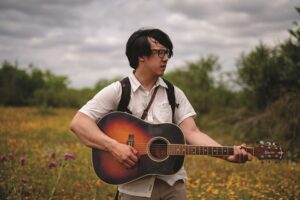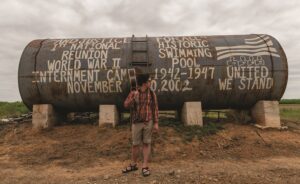Many Americans weren’t taught in history class about the U.S. government’s imprisonment of more than 120,000 Japanese Americans during World War II — much less that a swing band made up of detainees performed at one camp in Wyoming. Or that the first Asian people brought to the Americas were slaves and sailors on Spanish galleons. Or that in the same region of eastern Colorado where U.S. soldiers slaughtered Native Americans in the mid-1800s, Japanese detainees died and were buried 80 years later.

In his song “Where the Sand Creek Meets the Arkansas River,” musician and scholar Julian Saporiti sings, “Open up your eyes for a minute and give yourself to a place and time.”
That’s what Saporiti hopes audiences will do when they hear his songs. His “No-No Boy” multimedia project — which includes folk music, photos, and videos — will be the opening event of the 10th season of Twenty Summers at Provincetown’s Hawthorne Barn on May 12. As part of a weeklong residency, Saporiti will invite listeners to “build a little community for an evening and have nostalgia for history you never learned before.” And he will encourage them to consider how that past relates to both wider contemporary issues and their own family histories.
Saporiti earned a doctorate in ethnomusicology and American studies from Brown University in 2022 after 10 years of research and writing over 100 songs. While he jokes that his degree makes him “the most useless doctor in the world,” his streaming numbers show he’s achieving his goal of teaching Asian-American history to a wider audience than academic papers would reach. His song “Imperial Twist,” about Vietnamese bands that entertained GIs with American rock music during the war in Southeast Asia, has nearly 1.2 million listens on Spotify.
“Let’s say only 10 percent of the people actually listen to the lyrics and then learn the history,” he says. “That’s still 100,000 people.” And when he’s told that “The Best God Damn Band in Wyoming” — which celebrates some of the first musicians Saporiti discovered who looked like him — is an earworm, he laughs. “That’s the point!” he says. “It’s hard to get a whole book stuck in your head.”
Saporiti was born and grew up in Nashville, where he was surrounded by country music performers — but almost no other Asian Americans. His mother, a painter, fled her native Vietnam because of the war, and his Italian American father, originally from Dorchester, was a music producer.

Saporiti studied at Berklee College of Music in Boston, where his band the Young Republic was featured in an NPR spotlight and toured internationally. After a few years as a professional musician, Saporiti turned his attention to exploring his own heritage through music. Inspired by the 1957 novel by John Okada, which told the story of incarcerated Japanese Americans who refused to sign a loyalty pledge, he began using its title, No-No Boy, for his own project. His subsequent research included visits to former Japanese internment camps in Wyoming and Hawaii; the Colorado town where, in 1885, Chinese miners were slaughtered by a white mob and the Chinatown burned to the ground; and Angel Island in San Francisco Bay, where thousands of Asian immigrants first reached the U.S.
Saporiti’s family vacationed in New England when he was growing up, and he’s made more recent trips here to perform and teach, but his wife and bandmate, Amelia, has a closer tie to the Outer Cape: her great-aunt was artist Elspeth Halvorsen Vevers (1929-2019), a longtime Provincetown resident widely known for her mixed-media constructions. Saporiti says that he and his wife hope to reconnect with their family history in Provincetown. He also says that his research here may include field recordings of coastal sounds to incorporate into new projects involving ecology, climate change, and the environment.
“It’s about having time and space to sit with sounds or histories,” says Saporiti, “and whatever stories come my way then get transmitted to my artistic practice. I think being on the Cape is a great place to do that.”
“We wanted to acknowledge that the role of immigrants on the Cape is not a story that is often told,” says Twenty Summers Executive Director Aziz Isham. “Julian’s work is very much at the intersection of art and social justice, which is the core of our programming.”
“There’s so much consternation and divisiveness around immigration and race,” says Saporiti. “It’s fruitful to just sit with these histories presented in a nonconfrontational and artistic way. Then we can maybe have an open discussion without our guard up.”
Saporiti’s songs often function as conversation starters — a way to encourage people to empathize and learn more about the past and present.
“A small way to encourage a better society is to alleviate historical ignorance and promote a kind of citizen historian model,” he says. “I don’t raise my voice to scream and shout anymore. I raise it to sing.”
Folk Music and History
The event: Julian Saporiti’s ‘No-No Boy’ project at Twenty Summers
The time: Friday, May 12, 7 p.m.
The place: Hawthorne Barn, 29 Miller Hill Road, Provincetown
The cost: $30 general admission; see 20summers.org for information



